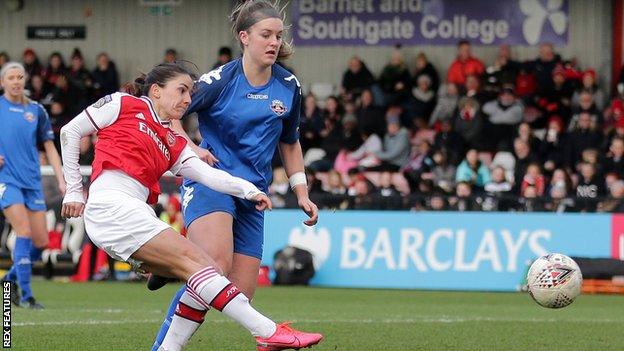Women's football has "massive opportunity" for broadcasting next season - Lewes
- Published

Arsenal were 2-0 winners over second-tier Lewes in the Women's FA Cup fifth round in February
The prospect of all football starting next season behind closed doors presents the women’s game with a "massive financial opportunity", says Championship club Lewes’ director Charlie Dobres.
The 2019-20 campaigns in England's top two women's leagues - the Women's Super League and Championship - formally ended on Monday.
In response, the Football Association said the decision was made in the best interest of the women’s game and would enable clubs to prepare and focus on next season.
It is not yet known when the new campaign will start, depending on government advice.
Speaking before Monday's announcement, Dobres told BBC Sport: "There is a chance to create a step-change in women’s football.
"If all of next season’s matches are behind closed doors, all of a sudden it’s all about the broadcasting.
"We can already see from the resumption of the K-league and Bundesliga, there is a strong appetite among sports fans generally to watch football because they can’t go to watch it live.
"So what we have now is an unexpected level playing field for football, when it comes to broadcasting. Let’s make the necessary investment to place the Women's Super League and Women's Championship on proper broadcast television."
For league games, BBC Sport and BT Sport currently broadcast a selection of WSL fixtures, with the remaining WSL and Championship matches streamed on the FA Player.
Lewes have called for all of next season's WSL and Championship games to be broadcast on television, to grow the audience for the women's game.
"You could then have big audiences for women’s football and then the possibility to sell advertising space, shirt space, and you’ll more than make back the investment you put in to it," Dobres added.
"If you’ve got everything in place to safely stage football matches at men’s Premier League or Championship venues, on the same day - it could be hours apart - using the same protocols and infrastructure, you could run a women’s football match too.
"We can also try and get women’s football back to where we where we were before it was banned in 1921. Let’s mark the 100th anniversary of the ban in 2021 by being able to say that, this time, the authorities did the right thing by the women’s game."